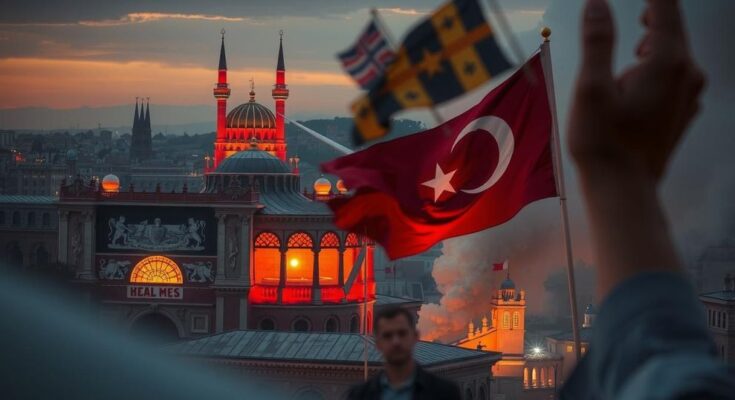The fall of Damascus has sidelined Russian and Iranian influence while enhancing Turkey’s role as a significant participant in Syrian politics. Diplomatic discussions prior to Assad’s departure proved futile as the urgency for political solutions intensified. Russia’s inability to address the evolving situation reflects the limitations of its control, with Turkey potentially stepping in to facilitate a government transition that reflects the aspirations of the Syrian people.
The recent fall of Damascus has profoundly shifted the geopolitical landscape in Syria, sidelining Russian and Iranian diplomatic efforts while elevating Turkey’s status as a pivotal player. As gunfire echoed in the liberated areas, diplomats from Russia and Iran found themselves powerless during a dialogue forum in Doha, struggling to maintain control over unfolding events. Prior to this turning point, key players convened to promote an end to hostilities and a political dialogue, but news of Assad’s fall rendered those discussions obsolete.
The discord among the diplomats was palpable as key Russian officials expressed concern over President Bashar al-Assad’s refusal to engage with Turkey, despite the military threats they represented. The urgency of the situation heightened when news broke that Assad had lost power, underscoring the rapidity with which diplomatic discussions can be rendered ineffective. Russian Foreign Minister Sergei Lavrov’s attempts to reassure stakeholders during a summit were met with probing questions about Syria’s future, revealing the tenuous nature of Russia’s influence.
Lavrov struggled with inquiries regarding the fate of Russian military installations in Syria, indicating the volatility of the situation and the complexity of regional politics. Meanwhile, Iranian foreign minister Abbas Araghchi clung to the hope of Assad’s survival, while also reflecting the limitations of Iran’s involvement in Syria as its position weakened dramatically.
In stark contrast, Turkey emerges as a potential beneficiary of these developments. With its resources rooted in the Syrian National Army, Turkey possesses the unique opportunity to lead efforts toward establishing a representative government in Syria, which is crucial for the nation’s long-term stability. As the landscape shifts, the role Turkey plays could significantly impact the political future of Syria and the surrounding region.
The Syrian civil war has attracted numerous international stakeholders, each vying to influence its outcome. Following a decade of conflict, the balance of power has shifted between various factions, with Turkey, Russia, and Iran among the key players. The discussions surrounding Syria’s future involve not only military strategy but also the political aspirations of its citizens and the need for a legitimate transition of power. The rise and fall of leadership within the country often reflect larger geopolitical battles in the region, underscoring the complexities faced by diplomats.
The abrupt fall of President Assad reveals the fragile nature of diplomatic power in Syria and highlights the shifting dynamics among regional players. Russia and Iran’s diminishing influence contrasts sharply with Turkey’s potential rise, as Ankara appears poised to play a crucial role in shaping Syria’s future. This situation underscores a critical juncture in the conflict, marking a need for new strategies to foster stability and unity in a war-torn region impacted by historical complexities and international rivalries.
Original Source: www.theguardian.com




